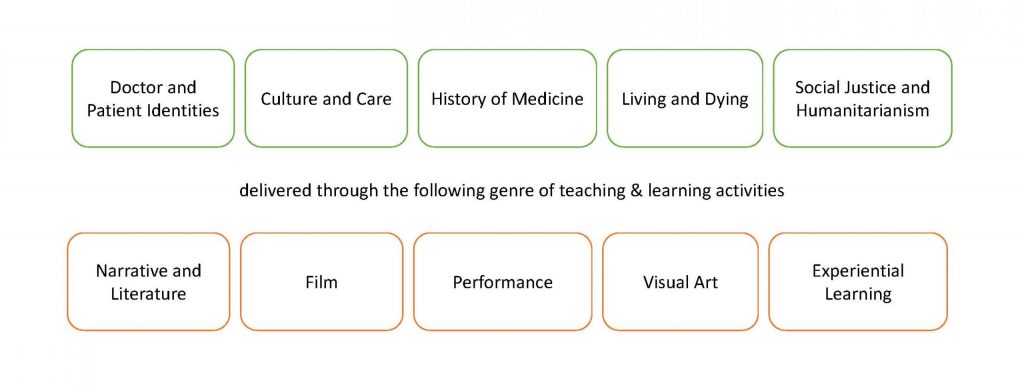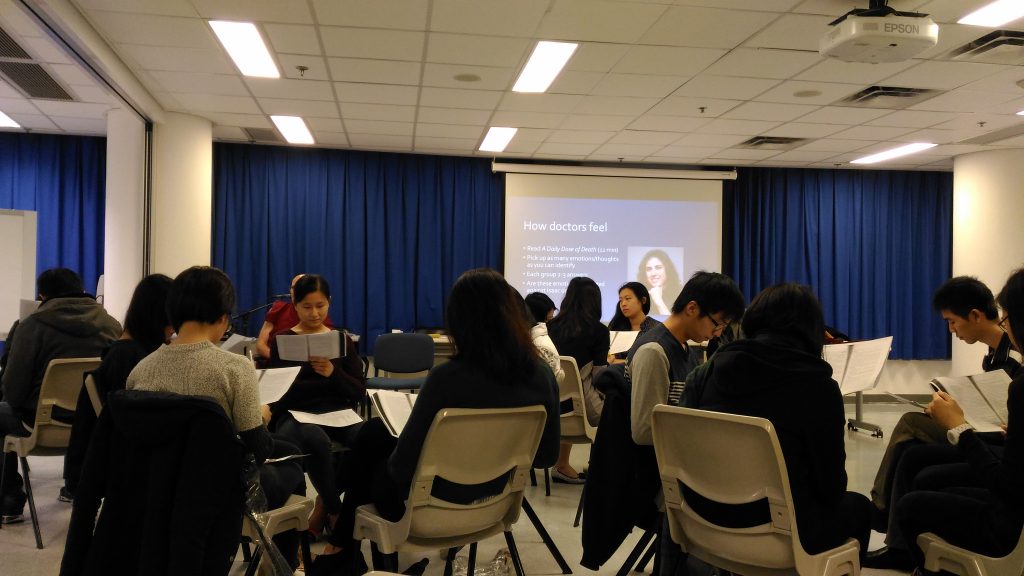Medical Humanities (MH)
The Medical Humanities (MH) Curriculum at LKS Faculty of Medicine is underpinned by a conceptual framework that begins with knowledge and self-exploration, then progresses to skill development, and finally to embodiment of attitudes and behaviours nurtured through medical humanities in clinical practice. It is a 6-year, compulsory longitudinal curriculum built around five designated themes based on the principle of outcome-based approach of student learning. The learning outcome is assessed through reflection or critical appraisal using conventional or creative means based on desired rubrics designed for different activities. 
The five themes are:
Doctor & Patient Identities
This theme explores who we are as individuals across the spectrum of medical qualification – from medical student on the first day of medical school to the most pre-eminent retired doctor – and the experiences, influences and dilemmas that we encounter, struggle with, are scarred by, and influence us to approach and practice medicine in the way we do. It is also about patients and their families and the equivalent experiences that they have had in a medical context that shapes the way they see, interact with, and trust their healthcare providers. And it’s also about what happens when these identities intersect – when doctor becomes patient, or patient becomes doctor.
Living & Dying
In medicine we have always been looking for ways to help our patients live longer, better and happier and when end-of-life is imminent, we look for ways to postpone the inevitable while maximizing quality of life. Living is dying and leads to myriad existential and practical questions.
Culture & Care
Culture provides the context in which we live and work. These are the ideas, customs and social behaviours that affect the way patients and doctors behave, thrive and survive. Think about Hong Kong culture, the culture of medicine, medical school culture. Think about the things that bring people together – beliefs, ethnicity, religion – and the things that drive people apart – beliefs, ethnicity, religion. Culture, spirituality and resilience are integral to care, our patients and our own.
History of Medicine
This theme acknowledges that we are continually influenced by the events and the traditions of the past in the way that we perceive and practice medicine. The language and words that we use, the biases we hold, the uniforms we wear, the habits we have formed, and the design of the hospitals and the structure of the health care system we work in are among the things we take for granted. Why do we practice medicine the way we do? Look at this with a more critical eye to see how perspective is shaped, for better or for worse, through the lens we choose or inherit.
Social Justice & Humanitarianism
At its heart, medicine is a profession of servitude. We are responsible for caring for the most vulnerable among us as well as the most privileged. But it is those who cannot access the wealth, opportunities and privileges of society that we are most obligated to help.
The five genres are:
- Narrative and Literature (including poetry)
- Performance (e.g. drama, music)
- Film
- Visual Arts (e.g. painting, photography, multimedia)
- Experiential Learning
In addition to the compulsory components of the curriculum, to accommodate the changing learning environment, we are putting more effort in creating optional opportunities and learner-led activities, allowing students to pursue new areas of interest.
The MH curriculum is completed during the Senior and Specialty Clerkships, where students spend tutorial time reflecting their experiences, learning and views of humanism in medicine. In particular, the importance of self-awareness and self-care, understanding suffering and healing and making value judgements in difficult circumstances is emphasised.


